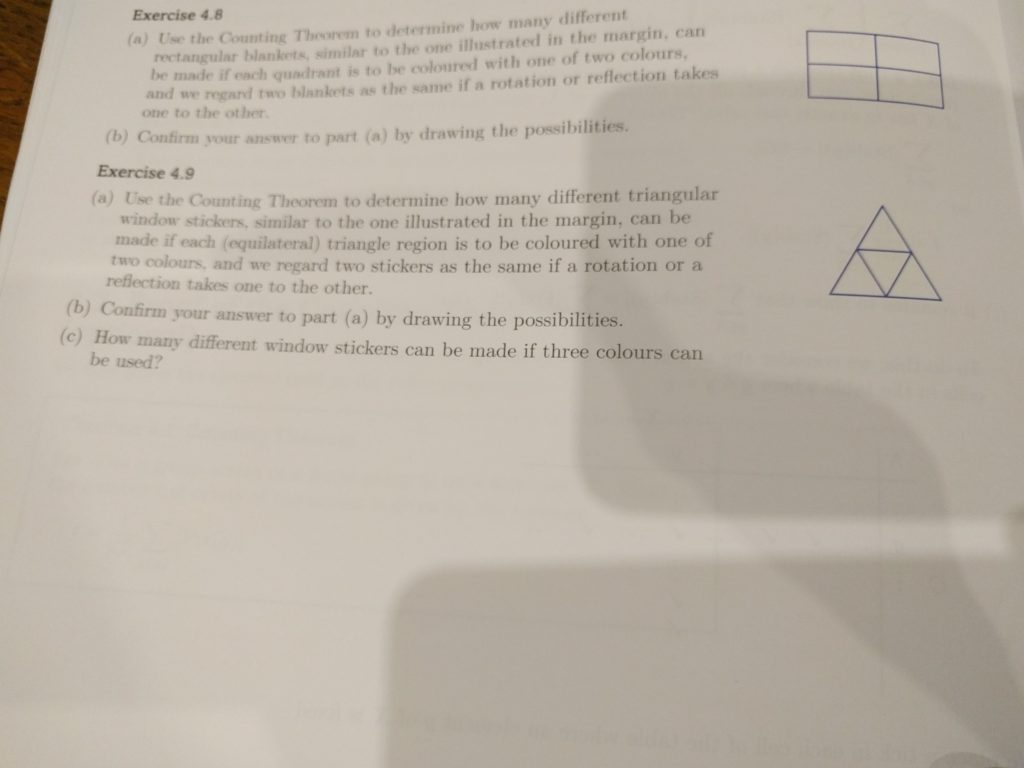My fifth assignment has been returned! And with it, the usual amount of feedback!
In this assignment, I failed to realise that a subgroup is normal if it is a union of conjugacy classes. So rather than form subgroups and state they were a union of conjugacy classes, I went through the process of proving each group was a sub group. Too long-winded, and frankly a waste of time. (for reference, this refers to Theorem 3.5 on properties of subgroups, p.74 in the handbook for M208).
There was another question where I had to show that a particular group had no subgroup of order 4. I took this rather literally, and found the only 4 possible combinations of elements that could be a subgroup of order 4, and then individually proved each one did not qualify either as a subgroup or as normal. Again, although I received full marks for this as it was correct, it was long-winded. It seems that all I needed to notice that a group of order 4 is either a typical cyclic group of order 4 (  ), or a Klein group (
), or a Klein group (  ). A property of
). A property of  is that it contains an element of order 4. But the question says the group has no subgroup of order 4! Therefore, my possible subgroups must be isomorphic to
is that it contains an element of order 4. But the question says the group has no subgroup of order 4! Therefore, my possible subgroups must be isomorphic to  . Property of
. Property of  : it contains three elements of order 2. This cuts the number of possibilities in half. Amazing how mindful you have to be of the properties of everything...
: it contains three elements of order 2. This cuts the number of possibilities in half. Amazing how mindful you have to be of the properties of everything...
When having to write down subgroups of a matrix group I thought I'd written two different subgroups, but they were actually the same. One of the entries in one subgroup was  , and the other was
, and the other was  . Now, these ARE both different. But they don't constitute as different general entries in my matrix, because they are both in
. Now, these ARE both different. But they don't constitute as different general entries in my matrix, because they are both in  . The correct answer had the second matrix with an entry that read
. The correct answer had the second matrix with an entry that read  , which of course has a different domain:
, which of course has a different domain:  , so it forms a different sub group. My brain had clearly just seen two different formulas and had gone "there we go, they're different!". Not so. Domains for subgroups must be checked!
, so it forms a different sub group. My brain had clearly just seen two different formulas and had gone "there we go, they're different!". Not so. Domains for subgroups must be checked!
This is incredibly easy to forget: When trying to prove something is not true, don't leave it at the generalised proof that it's not true. If it's not true, provide a specific counter-example. With numbers! Remember those? The things that you count with that aren't letters? Duh! Yes, so I know to be vigilant now...
I had some trouble explaining a mapping of complex numbers in English. This is problematic. I could've programmed it and shown you the mapping and in an instant you would've thought "ah yeah!". But with lengthy explanations about how we get to the point where the real part gets mapped to the inverse of the imaginary etc etc... things can get a bit muddled. It seems I need to resort to explaining things mathematically more often, using the facts I already have.
I need to do more reading on the Isomorphism Theorem (specifically with regard to the domain of the Image that the quotient group is isomorphic to). Wow, that was a bit wordy... Ultimately I need to be more mindful about domains of Images...
So that's it! Again, happy with my high mark, but lots to remain mindful of...

